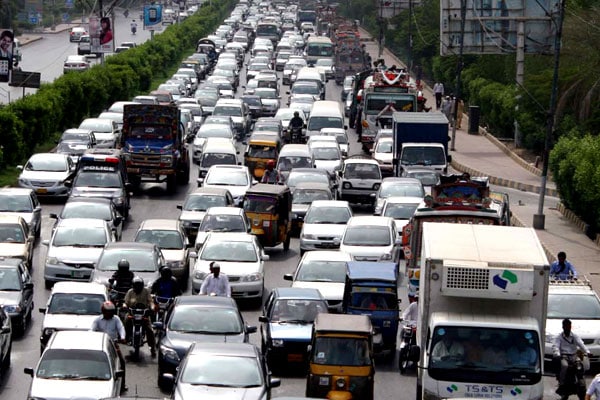KARACHI – The traffic restrictions imposed by the Sindh government to curb road accidents would come into effect from Wednesday (today), with the Deputy Inspector General (DIG) of Traffic issuing strict instructions to officers for enforcement.
Following the Sindh government’s decisions, a key meeting chaired by the DIG Traffic was held, during which officers were directed to strictly implement traffic regulations.
All SSPs and DSPs participated in the meeting, where multiple decisions were made to improve and enhance the city’s traffic system. The officers were instructed to enforce traffic laws rigorously.
The meeting directed strict checking of old, dilapidated and heavy vehicles including tankers, trailers, buses, and dumpers across the city. The legal action would be taken against vehicles lacking front and rear safety guards or under-runs on both sides.
The officers were instructed to ensure that under-runs are installed on the sides of vehicles for road safety. The tankers leaking water or with faulty valves—posing a risk of accidents—must be immediately removed from roads.
The severely worn-out or dilapidated buses should be taken off the roads and subjected to legal action to protect human lives.
Wearing helmets has been made mandatory for motorcyclists. Bikes of riders without helmets will be confiscated and only returned once they present a helmet and a valid license.
On-the-spot fines would be issued to drivers without a license. A crackdown would also be launched against the vehicles with the fancy number plates, black tinted windows, blue lights, hooters and sirens.
The DIG directed that extra-seater and 9-seater rickshaws are now banned from operating on specific routes, including:
Karsaz to Hassan Square
Drigh Road to Sohrab Goth
Millennium Mall to New Town
Mauripur to Gulbai
I.I. Chundrigar Road to Tower
Avari to Madam Apartments
The FIRs would be registered against those engaging in double or triple parking.
Action would also be taken against the relevant contractors including legal steps for cancellation of their lease agreements.
The effective action would be taken against encroachments in the city.
The meeting also announced a crackdown against drug-addicted drivers, introducing dope testing based on blood and urine samples to confirm drug use before taking legal action.
According to the official statement, the officers were informed that all heavy vehicles must now be equipped with trackers and front/rear view cameras including cabin cameras to monitor the driver activities.
What are penalties?
A fine of Rs5,000 would be imposed on heavy vehicles without trackers while the vehicles with installed but non-functional trackers would face a fine of Rs7,000.
The maximum speed limit for HTV (heavy transport vehicles) within the city has been set at 30 km/h. The violators would be fined Rs2,000 for the first offense and Rs4,000 for repeat violations.
The meeting also revealed that surveillance cameras are being installed under the Safe City Project. These would enable issuing fines based on number plate identification.
If the vehicle is being driven by someone other than the registered owner, the fine would still be issued in the owner’s name.
A 21-day deadline would be given for payment of the fines. The failure to pay within this period would result in the fine being doubled.
If the fine remains unpaid for over three months, the driver’s license will be revoked, and the national identity card will be blocked. A complete ban has also been imposed on inter-district buses entering city limits. Security personnel will be deployed at designated points to prevent these buses from entering urban areas.
KBA President Amir Nawaz assaulted in Karachi amid canals issue










